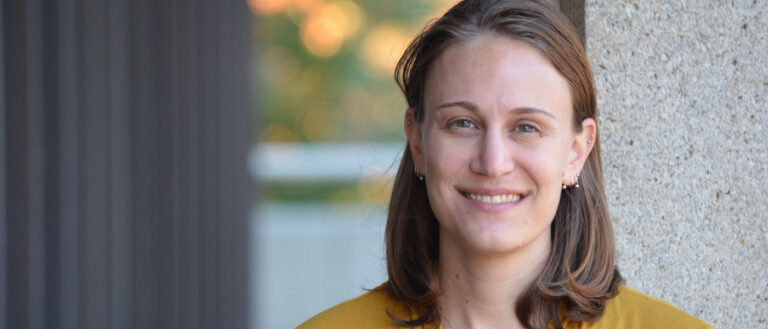Karen Abbott’s mentoring philosophy dates back to her time as a graduate student. One day, as she was reading a research paper to “glean wisdom” from her brilliant elders, she had a revelation: Much of the work she was reading was that of her peers.
She has been continuously inspired by graduate students ever since.
“I have come to recognize that taking care of grad students is one of the single most important things we can do to keep our research communities vibrant and healthy,” Abbott, now a professor of biology, said.
Abbott’s focus on their success and well-being led to her being named a recipient of the John S. Diekhoff Award for Graduate Mentoring, an honor she will officially receive during the university’s commencement ceremonies on Sunday, May 15.
On equal ground
Abbott’s research is interdisciplinary and brings students of different backgrounds into the lab—each with different needs. While Abbott varies her teaching and mentoring techniques to ensure each student reaches their potential, there is one method she uses across the board: treating them as colleagues.
“Yes, they begin as novices, but I treat them with the same respect—and grant them the same kind of intellectual freedom—as I would a typical collaborator,” she said. “In return, they are expected to think and work at a high level.”
Brain Lerch (CWR ‘19, GRS ‘19) spent four years in Abbott’s lab and in his nomination said, “Dr. Abbott has a unique ability to give mentees control over their path and foster independence, while also giving rapid and well-reasoned feedback.”
Leading by example
Inside and outside of the lab, Abbott advocates for graduate students. From 2018 to 2021, she was the Department of Biology’s director of graduate studies (DoGS). While she had an idea about challenges the students faced, ultimately, she let them advocate for themselves by forming “DoGS Council,” a group of volunteer graduate students in the department who went on to establish many student-led initiatives focused on mental health, diversity and other important issues.
“I owe all of my current success and happiness with my career to her mentorship,” recalled Samantha Catella, one of Abbott’s previous PhD mentees. “She taught me how to advocate for myself and encouraged me to pursue the ideas I was most passionate about.”
“I invest a lot in mentoring because I get a lot out of it,” Abbott said. “It’s wonderful to realize that students appreciate what I do.”
About the award
The Diekhoff Award honors John S. Diekhoff, a distinguished scholar, teacher, mentor and administrator who served Case Western Reserve in several capacities during his tenure from 1956 to 1970: professor of English, chair of the Department of English, dean of Cleveland College, acting dean of the School of Graduate Studies and vice provost of the university.
The Diekhoff Award, established in 1978, recognizes outstanding contributions to the education of graduate students through advising and classroom teaching. The annual award is presented to two faculty members who epitomize what it means to teach graduate students: to connect them with experts in their discipline, engage them academically in a forthright and collegial manner, and actively promote their professional development. In 2009, the Diekhoff Award was expanded to recognize two additional full-time faculty members who excel in the mentoring of graduate students. A committee of Graduate Studies students reviews the nominations and recommends winners.


